Homebrewing is an art that requires precision, patience, and attention to detail. One of the critical aspects of brewing exceptional beer at home is managing the fermentation process, particularly temperature control.
This blog post delves into why having a fermentation chilleris crucial for homebrewers, ensuring every batch meets the highest standards of quality and consistency.
The Science Behind Fermentation
Fermentation is the heart of brewing. It’s during this stage that yeast converts sugars into alcohol and carbon dioxide, creating beer’s distinct flavors and aromas. However, this delicate process is highly sensitive to temperature fluctuations.
Impact of Temperature Fluctuations
Temperature plays a vital role in the activity of yeast. Too high a temperature can cause yeast to become overly active, leading to off-flavors and unwanted esters. Conversely, too low a temperature can slow down or even halt fermentation, resulting in under-attenuated beer with incomplete flavors.
Ideal Temperature Ranges
Different brews require specific temperature ranges for optimal fermentation:
- Ales: Typically ferment best between 60-72°F (15-22°C).
- Lagers: Require cooler conditions, often between 45-55°F (7-13°C).
- Sour Beers: Can vary widely but often benefit from stable, moderate temperatures similar to ales.
Maintaining these ideal temperatures is crucial for achieving the desired flavor profile and overall quality of your beer.
Traditional Cooling Methods vs. Fermentation Chillers
Limitations of Traditional Methods
Traditional cooling methods, such as ice baths, swamp coolers, and coolers, can be cumbersome and inconsistent. They often require frequent monitoring and adjustments to maintain the desired temperature, which can be labor-intensive and still lead to fluctuations.
Introduction to Fermentation Chillers
Fermentation chillers offer a more precise and reliable solution. These devices are designed specifically to maintain consistent temperatures throughout fermentation. By using a fermentation chiller, homebrewers can ensure their yeast operates within the optimal range, resulting in better control over the flavor, aroma, and overall quality of the brew.


